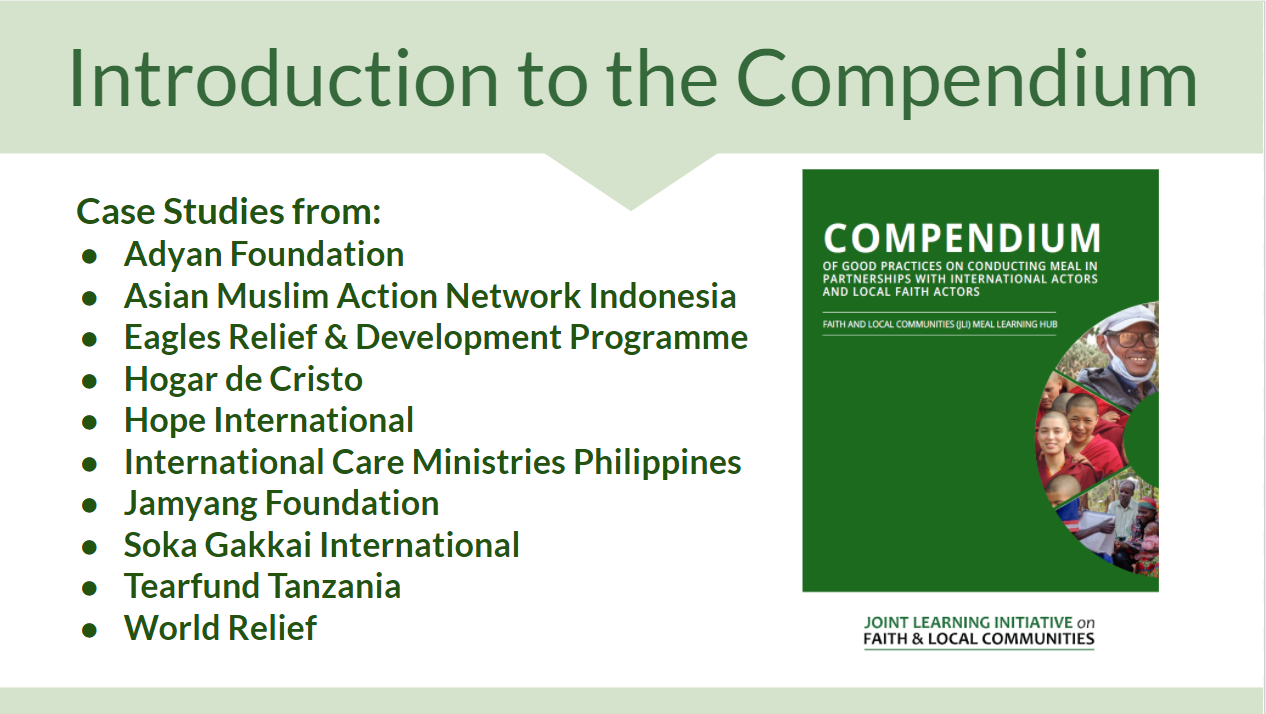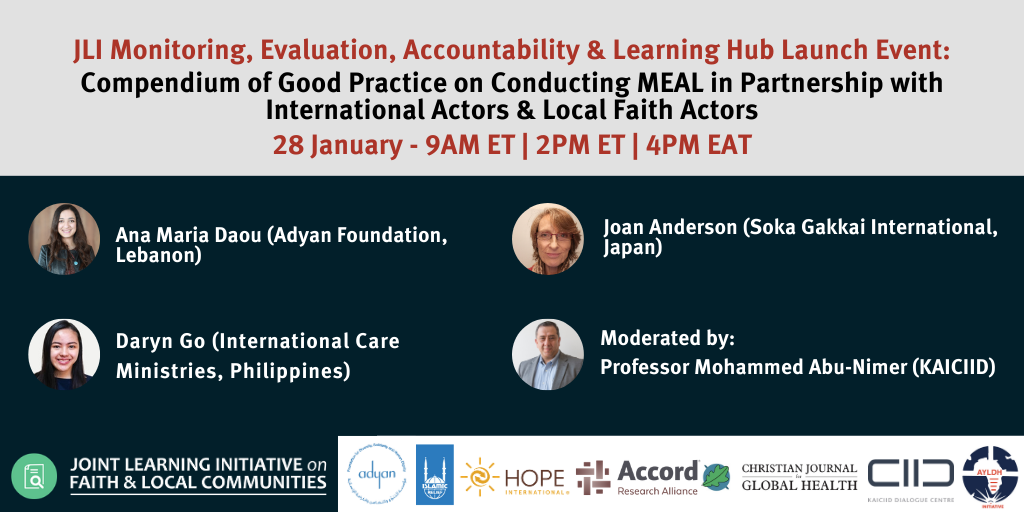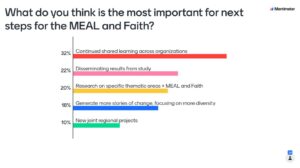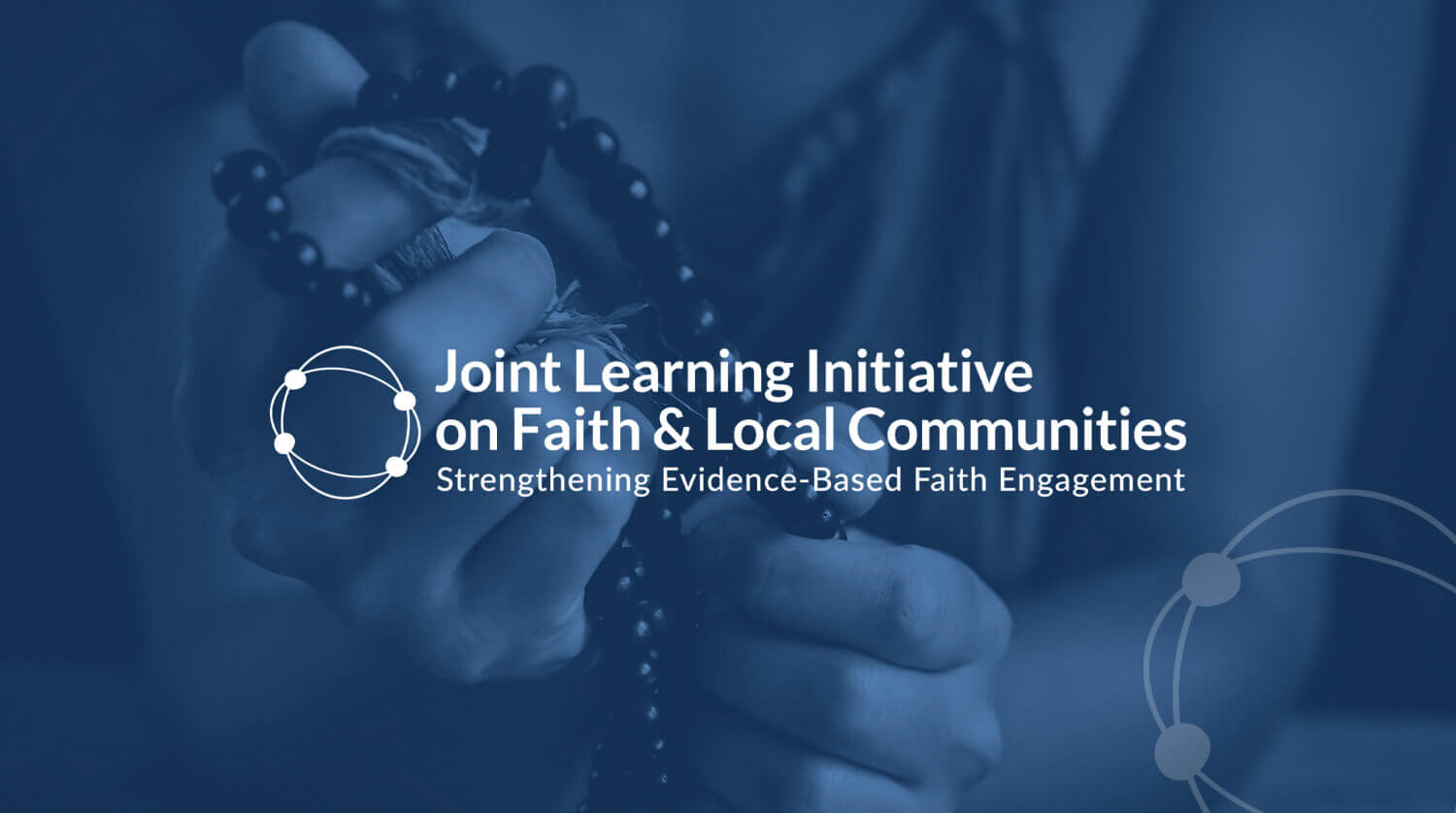
The JLI MEAL Hub launched a new ‘Compendium of Good Practices Conducting MEAL in Partnerships with International Actors and Local Faith Actors’
The Compendium, launched this January, explores good practices of MEAL in partnerships between international actors and local faith actors. It is based on more than 30 interviews with representatives of secular and faith-based international organisations, local faith actors, and academics. It also includes a selection of 10 stories of change that illustrate the diversity of MEAL practices around the world.
Read the Compendium here.
View the summary brief here
The Compendium was launched in an online panel event that brought together speakers and stories of MEAL from different faith traditions and from across the world. Speakers included:
- Dr Jennifer Philippa Eggert (Senior Research Associate, JLI)
- Ana Maria Daou (Adyan Foundation, Lebanon)
- Daryn Go (International Care Ministries, Philippines)
- Joan Anderson (Soka Gakkai International, Japan)
- Jessica Baumgardner-Zuzik (Alliance for Peacebuilding, USA)
- Hamayoon Sultan (Independent Consultant, UK)
- Moderated by Professor Mohammed Abu-Nimer (KAICIID, Austria) with a welcome by Kirsten Laursen Muth (CEO, JLI)

Dr Jennifer Philippa Eggert, lead researcher and author of the Compendium, gave an insight into how it was developed. She spoke of how the research team made concerted efforts to reach out to non-Western organisations, including Muslim, Hindu, Sikh and Buddhist organisations. The contributions and stories of non-Western and non-Christian organisations ultimately helped the Compendium move beyond its original purpose, by not just highlighting examples of good practice within Western frameworks, but also questioning the very need for these in all circumstances. As Dr Eggert concluded, “We hope to move the conversation one step further and really question if the end goal is for everyone to adopt Western-style MEAL, or is there maybe space for something else as well?”

The panellists gave an overview of their own organisational MEAL practices. Ana Maria Daou outlined Adyan Foundation’s methodology using the IMPACT acronym (Information, Measurement, Presentation, Accountability, Challenges, Transfer); Daryn Go spoke of how International Care Ministries used COVID restrictions as an opportunity to do regular phone surveys with local faith leaders, in turn ministering local faith leaders and developing faith-rooted, supportive friendships with them; Joan Anderson talked about Soka Gakkai International’s horizontal structure, which removes the power differential of donor-beneficiary relationships, and instead allows their MEAL approach to focus on monthly local meetings where participants can share feedback or stories of change.
The discussants, Jessica Baumgardner-Zuzik and Hamayoon Sultan endorsed the Compendium’s solutions-based and locally-rooted approach, and shared their own experiences of the power imbalance between international donors and local faith actors.
Attendees were able to participate in an ongoing discussion alongside their event, sharing their own questions, experiences and stories of MEAL in international and faith actor partnerships. Contributions included:
- Questions around how to characterise and differentiate “Western” vs. “non-Western” MEAL. Some attendees asked if “Western” MEAL could be characterised as more quantitative analysis, whereas “non-Western” MEAL may be more focussed on storytelling. One attendee questioned if “indigenous MEAL” might be a more useful term.
- Discussions around the costliness, complexity and burden of Western MEAL approaches for local actors that lack the resources to implement them.
- The need to look at the power dynamic between international and local faith actors, particularly in the context of efforts to decolonise development.
- Suggestions and stories of good practice MEAL approaches used by attendee organisations, e.g.: participatory learning approaches, storytelling, behavioural change communication, incorporating MEAL into the project implementation itself, developing MEAL tools in consultation with local faith leaders, feedback loops etc.
- The benefits and challenges of storytelling approaches. While storytelling might be tied into a communities’ history and culture, utilising storytelling for MEAL can be challenging. One participant raised their experience of getting informed consent to utilise and analyse excerpts of stories from indigenous elders – who were concerned that their stories may be ascribed unintended meanings.
- How to increase Western donors’ trust in MEAL approaches that rely more on stories and beneficiary feedback.
The session closed with a series of Menti survey questions, asking participants:
1. What do you think are the most important next steps for the JLI MEAL and Faith Hub?

2. How can the JLI MEAL Hub collaborate with your organisation on faith and MEAL?
Response to this second question included suggestions for the JLI MEAL Hub to facilitate knowledge and resource sharing, e.g. through sharing of best practice methodologies, case studies and pilot projects, sharing resources between members to avoid duplication of efforts, and facilitating shared learning on specific topics, e.g. through regular virtual events or by producing joint M&E guides on key topics.
Many attendees spoke of their desire for the JLI MEAL Hub to support better connections and relationships, both between Hub members internally e.g. through regular internal meetings, but also externally with other donors and practitioners – for example, providing platforms for members to attend external meetings and share their successful case studies.
Attendees also suggested that the JLI MEAL Hub should support and facilitate research, for example through conducting its own research, facilitating peer reviews between members, and encouraging organisations to submit their research for publication. Attendees also recommended the JLI MEAL Hub develop capacity-building opportunities for individuals working in the arena of MEAL and faith.
The JLI MEAL Hub hopes for this Compendium to be a practical and transformative resource for anyone interested in, or working in, the areas of MEAL and faith – whether international donors, secular or faith-based development organisations or local faith partners.
For more information, download the Compendium here, or sign up to the JLI MEAL Hub here
Read the press release for the Compendium launch here






